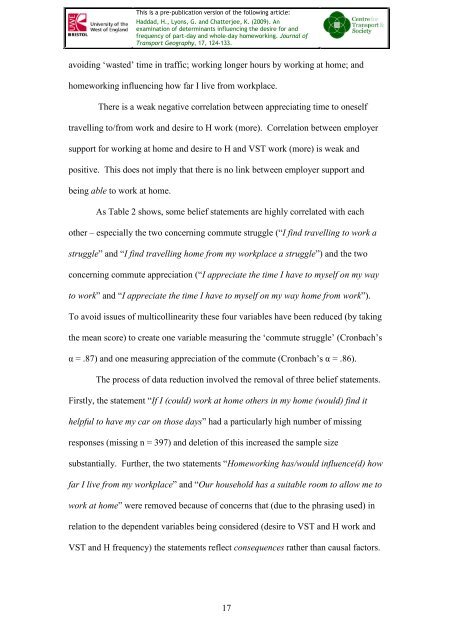Haddad, H. , Lyons, G. and Chatterjee, K. (2009) - UWE Research ...
Haddad, H. , Lyons, G. and Chatterjee, K. (2009) - UWE Research ...
Haddad, H. , Lyons, G. and Chatterjee, K. (2009) - UWE Research ...
You also want an ePaper? Increase the reach of your titles
YUMPU automatically turns print PDFs into web optimized ePapers that Google loves.
This is a pre-publication version of the following article:<br />
<strong>Haddad</strong>, H., <strong>Lyons</strong>, G. <strong>and</strong> <strong>Chatterjee</strong>, K. (<strong>2009</strong>). An<br />
examination of determinants influencing the desire for <strong>and</strong><br />
frequency of part-day <strong>and</strong> whole-day homeworking. Journal of<br />
Transport Geography, 17, 124-133.<br />
avoiding „wasted‟ time in traffic; working longer hours by working at home; <strong>and</strong><br />
homeworking influencing how far I live from workplace.<br />
There is a weak negative correlation between appreciating time to oneself<br />
travelling to/from work <strong>and</strong> desire to H work (more). Correlation between employer<br />
support for working at home <strong>and</strong> desire to H <strong>and</strong> VST work (more) is weak <strong>and</strong><br />
positive. This does not imply that there is no link between employer support <strong>and</strong><br />
being able to work at home.<br />
As Table 2 shows, some belief statements are highly correlated with each<br />
other – especially the two concerning commute struggle (“I find travelling to work a<br />
struggle” <strong>and</strong> “I find travelling home from my workplace a struggle”) <strong>and</strong> the two<br />
concerning commute appreciation (“I appreciate the time I have to myself on my way<br />
to work” <strong>and</strong> “I appreciate the time I have to myself on my way home from work”).<br />
To avoid issues of multicollinearity these four variables have been reduced (by taking<br />
the mean score) to create one variable measuring the „commute struggle‟ (Cronbach‟s<br />
α = .87) <strong>and</strong> one measuring appreciation of the commute (Cronbach‟s α = .86).<br />
The process of data reduction involved the removal of three belief statements.<br />
Firstly, the statement “If I (could) work at home others in my home (would) find it<br />
helpful to have my car on those days” had a particularly high number of missing<br />
responses (missing n = 397) <strong>and</strong> deletion of this increased the sample size<br />
substantially. Further, the two statements “Homeworking has/would influence(d) how<br />
far I live from my workplace” <strong>and</strong> “Our household has a suitable room to allow me to<br />
work at home” were removed because of concerns that (due to the phrasing used) in<br />
relation to the dependent variables being considered (desire to VST <strong>and</strong> H work <strong>and</strong><br />
VST <strong>and</strong> H frequency) the statements reflect consequences rather than causal factors.<br />
17

















